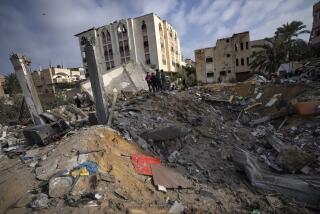Four Car Bombs Kill 20 People, Hurt 113
BAGHDAD — As U.S. military officials and Samarra residents assessed the damage from a major weekend offensive to rid the city of guerrillas, insurgents took their campaign into the heart of the capital and elsewhere, setting off four car bombs that killed at least 20 people and wounded more than 100.
A four-wheel-drive vehicle exploded before 9 a.m. outside a gate to the Green Zone -- the heavily fortified section of central Baghdad that houses the offices of the interim government and the U.S. and British embassies. The vehicle, reportedly packed with artillery shells, detonated near a recruiting center for the Iraqi security services.
Car bombers have set off nearly 40 bombs since Sept. 1, often at such recruiting stations.
Officials have tried to protect recruits by moving the stations and erecting barriers in front of them. Many of the recruits on Monday stood behind a large concrete blast wall, but the explosion outside the Green Zone still killed at least 15 and wounded 81, an official of Baghdad’s Yarmouk Hospital told Associated Press.
Another bomber struck less than an hour later, on Saadoun Street, a main artery and commercial strip in the heart of Baghdad. Witnesses said the bomber was targeting a U.S. convoy. No U.S. personnel were injured by the blast, which killed at least two civilians and wounded 20, hospital officials said. News agency reports put the death toll as high as six.
A pair of vehicles also exploded in Mosul, 225 miles northwest of Baghdad. In the first incident, a car blew up in the Wadi Hajar neighborhood, near a primary school. The blast killed three people and wounded 11, including six children, hospital officials said.
Witnesses reported that a young man standing near the car had screamed that it was going to explode.
“He repeated this phrase several times. Some people ran away, but the others who did not respond quickly were among the victims,” said Hamza Khalaf, who escaped unharmed.
The second car bomb in Mosul targeted a U.S. convoy. One soldier suffered minor injuries, an officer on the scene said.
Elsewhere in Iraq, a pair of Indonesian women were released, and two other hostages apparently were executed.
The two women were handed over to the United Arab Emirates Embassy in Baghdad late Monday. Abu Dhabi TV broadcast footage of the pair sitting in an embassy lounge with officials. The women were kidnapped last week with six Iraqi and two Lebanese men, but the condition of the eight other hostages remained unknown.
Al Jazeera satellite network broadcast footage of the apparent execution of two hostages, a Turk and an Iraqi. The broadcast showed two men seated on the floor in front of several armed men. They were then shot in the head.
In Italy, the family of a kidnapped Iraqi businessman said the government had notified them that he had been killed by his captors.
In Samarra, U.S. military commanders fanned out across the city to meet local government officials and residents. A team of U.S. and Iraqi engineers began to survey the damage to determine what was needed to restore services to the city. Many parts of Samarra were still without electricity, but the water treatment plant reopened Monday evening.
Military leaders said they hoped to restore full power within a few days, but one military engineer said it could take up to two weeks.
“Now starts the work to get this city back on its feet,” said Army Maj. Gen. John Batiste, commander of the 1st Infantry Division.
The U.S. military has already earmarked about $1.5 million for infrastructure projects in the city, including schools, roads and water.
Although the military used mosque loudspeakers to tell residents it was safe to come out, the streets were still largely empty. A few people who ventured out carried white flags or T-shirts to signal to U.S. snipers that they weren’t a threat. Several cars had white flags hanging out all of their windows.
One resident approached U.S. soldiers seeking permission to bury his brother in the local cemetery. He was told he didn’t need approval, but still appeared worried about being attacked by U.S. patrols.
Samarra Hospital remained largely abandoned; many doctors had not yet returned to their posts. U.S. officials said they would clean and sterilize the facility, which was covered by dust and dirt after clashes in the area.
The U.S. military estimated that 127 insurgents and 20 civilians were killed in the fighting.
On Monday, the Army announced that Sgt. Michael A. Uvanni, 27, of Rome, N.Y., had been killed by sniper fire Friday in Samarra. The U.S. military also said two soldiers had died when insurgents attacked a Baghdad checkpoint Sunday. Another soldier was killed when his convoy was hit by a roadside bomb near the capital Monday night, a military spokesman said. Their identities were not disclosed. At least 1,057 troops have died since the war began.
Troops continued patrolling Samarra and raiding suspected insurgent hide-outs. One raid targeted a suspect believed to be running a cell connected to Jordanian militant Abu Musab Zarqawi. Officials said they did not find Mahmoud Kamal Mahmoud, known as Kamal the Tailor, but detained his brother, along with documents that included advice on bomb-making and killing police.
Samarra has reportedly been a stronghold for Zarqawi’s Jamaat al Tawhid wal Jihad movement.
Khalil reported from Baghdad and Sanders from Samarra. Special correspondents Roaa Ahmed in Mosul and Raheem Salman in Baghdad, and Times wire services, contributed to this report
More to Read
Sign up for Essential California
The most important California stories and recommendations in your inbox every morning.
You may occasionally receive promotional content from the Los Angeles Times.










